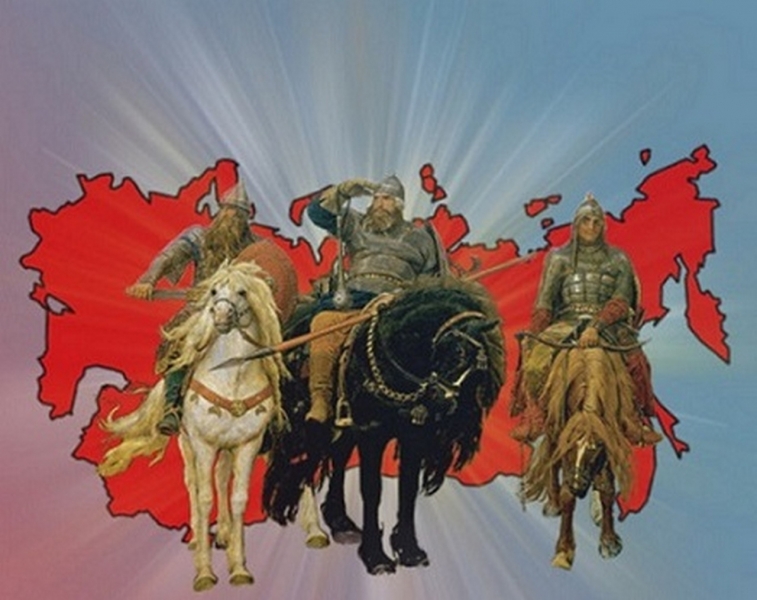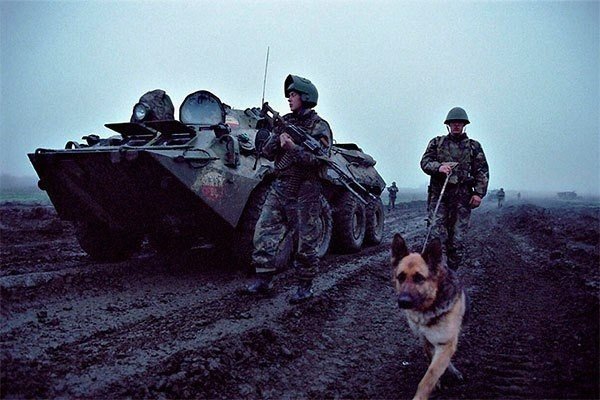The phrase "Russian world" is constantly flashing in the media. Can someone explain, what it is? If this space, on which Russian culture is supported and developed, if these are states, friendly to Russia, ready to stand with us shoulder to shoulder in the difficult hour of trials, it must be admitted, that today the space of the Russian world is limited by the borders of the Russian Federation and the Russian world ends at the Russian border post.

National republics of the CIS
In the 90s, when the USSR broke up into separate states, self-implied, that the former friendly relations will remain between the republics, unless only newly formed states will have more economic independence. And in the international arena it will be the same "unbreakable union of free republics", and if the countries of Eastern Europe plus the Baltics leave Moscow's care, then the CIS countries will remain reinforced concrete in its sphere of influence.
In fact, all the republics of the CIS (with the exception of, perhaps, except Kazakhstan) immediately tried to free themselves from the tutelage of Moscow and began to build mono-national states. The construction was accompanied by an exorbitant protrusion of its own importance and the exposure of Russia as an age-old oppressor. And almost everywhere the acquisition of self-awareness by the aborigines was accompanied by the persecution of the non-indigenous population..
The worst share fell on the Russian-speaking residents of the republics of Central Asia, where it came to pogroms and murders. The non-indigenous resisted everywhere. Baltics worried, north of Kazakhstan, Crimea. But only Nagorno-Karabakh defended the right not to become a national minority in their land., Abkhazia, South Ossetia and Transnistria, who took up arms for this. Other pockets of resistance were either extinguished or crushed.
Refugees flocked to Mother Russia. People were leaving, selling property literally for a penny, and sometimes they ran, taking only their lives with them. E wrote bitterly about those days. Lukin:
Two borders passed.
Shreds of ruby.
Hello, aunt Rodina,
I am from Karabakh!
Three borders passed.
The folds of the brow.
Hello, aunt Rodina,
I am from Transnistria!
All four passed.
I will fall - I will not rise.
Hello, aunt Rodina,
I am from Tajikistan!
Behind the lining - a hundred.
We move lame.
What are you, bastard-aunt?
Ali is not native?
Moscow point blank did not notice tens and hundreds of thousands (who counted them then?) compatriots, wandering across borders. Nobody needed them, nobody cared about them. But who survived the 90s, he will not blame the Motherland.
Russia 90s
The economy was falling apart, in some regions, local authorities introduced cards for goods, the enterprises did not pay salaries for months. Money depreciated at an amazing rate.
And at the same time, fortunes were made literally out of nothing, the division of the property of the deceased USSR was more like the division of the loot by the bandits, accompanied by shots and explosions of Mercedes.
Before the refugees were there in such an environment? And while Russia was struggling in childbirth fever, surrounding states, taking advantage of the moment, embarked on an independent voyage, while trying to push as far as possible from the ship with the name "Russia". Someone has succeeded more, someone less, but no one gave up the independence that fell on his head.
Russia and the former republics of the USSR today
The Baltic states from the first day openly declared, that they base their foreign policy on hatred of Russia. Well, well, and thanks to them for that. Although we know, that these are outright enemies. In response, Russia has embarked on a course of economic strangulation of the "Baltic tigers", and, without folding, moving in that direction.
Since now there is no need to worry about maintaining good neighborly relations with the Baltic countries, the media constantly pedalizes the topic of oppression of Russians in the Baltics. In the public consciousness, the Baltic states are clearly positioned as openly unfriendly states, EU and NATO members, from which you should not expect anything good.
Other states verbally declare their friendly feelings towards Russia. But in fact ... B 2014 year Crimea was recognized as part of Russia 6 states: Afghanistan, Venezuela, Cuba, Nicaragua, Syria, North Korea. Where are our "brothers in the USSR"?
Lukashenko's father, our seemingly most loyal ally, prefers to maintain a proud neutrality, thus demonstrating the independence of its international policy. We also remember about Belarusian shrimps and mussels, unprecedented apple harvest in this country. Such an "ally" cannot be called reliable..
When in 2008 year Russia recognized South Ossetia and Abkhazia, which of our yesterday's brothers in the USSR stood side by side shoulder to shoulder? Correctly, no one.
To be honest, let's say, that representatives of a number of countries in the UN regularly vote against Ukrainian resolutions in support of the territorial integrity of Ukraine (Armenia, Belarus, Kazakhstan, Uzbekistan). Well, thank you anyway.
In no state, where pogroms of Russians took place in the 90s, no government has recognized the fact of the persecution of Russians, did not apologize, not to mention compensation for property, lost in the process of forced emigration. Lost lives? Crippled fate? All former Soviet republics are silent, as if there was no such thing. And in all republics, without exception, the percentage of the Russian-speaking population is decreasing, which says only one thing: Russians are being crushed there, Russians flee from there.
The myth about our former fellow citizens
From time to time, one of the State Duma deputies raises the question of the need to grant Russian citizenship to all residents of the former USSR, pushing, what, they say they are "our compatriots". I have to remind, what was it to whom in the 90s 30 today already 60. The current 30-year-olds grew up on textbooks “the Russians oppressed us 300 years and if not for the damned Russia ... ", and if anyone thinks, that today the indigenous inhabitants of the republics formed on the wreckage of the USSR are sleeping with a volume of Pushkin under their pillow, so he is deeply mistaken.
Recent events in Georgia have shown, that Russophobia in our neighbors blooms and smells. And it doesn't smell like violets. And Georgia is no exception. Our former "compatriots" for a long time will explain the failure of their states to the people by "centuries-old Russian occupation", thereby diverting the anger of the common people from themselves.
Ukraine stands out among the CIS republics, Belarus and Kazakhstan. I would like to dwell on these three republics and talk in more detail.
Ukraine, Belarus and Kazakhstan
For a long time Ukraine seemed to be an island of calm amid tragedies, played on the territory of the USSR. In Ukraine, thanks to the close kinship of the Ukrainian and Russian peoples, the process of the division of the USSR passed without accompanying tragic events. Unrest in Crimea did not escalate into a riot, Odessa also calmed down, which was promised port-free. However, the “surge of national identity” did not bypass Ukraine either.. As you can see, it was only postponed and the longer the boiler boiled, the stronger the explosion was.
And what's most tragic, he showed, that a conflict can be kindled even within one people, people of the same nationality: leader of the "Right Sector" Dmitry Yarosh was born not in Western Ukraine, and in the east of the country, in the Dnipropetrovsk region. Regiment commander "Azov", Andrey Biletsky is from Kharkov. Sergey Kulchitsky was born into a military family in Germany, graduated from the Suvorov Military School in the Far East, graduated from a military school there, served in the North, ended up in Ukraine only after the collapse of the USSR. However, this did not prevent him from becoming a general of the National Guard of Ukraine and perishing in the Donbass..
And today in Donbass not only representatives of Galicia are fighting, but also the natives of Zaporozhye, Odessa, Kharkov, Nikolaev, etc.. Russian-speaking cities.
It is still quiet in Belarus, but those who follow the events in this country know, that the republic is slowly following the Ukrainian course. true, media say, that the process of building a unified state of Russia-Belarus is proceeding by leaps and bounds, but so far this state does not exist.
President of Kazakhstan Nazarbayev did everything, to prevent national demarcation in the republic. However, the process of "national revival" is underway there too.. While peace in the republic is kept solely by the authority of the first president, and even after retiring, he remains the most influential politician in the country. But we are all mortal and afraid, that in Kazakhstan the explosion of Russophobia is only postponed for a while.
But we would be wrong, if we had not raised the issue, how does Russia itself relate to the idea of expanding the Russian world.
Alien land
When the USSR collapsed, many for a long time did not want to accept this as a fait accompli. Russia's loss of vast territories was perceived with pain, it's like losing a finger or hand and the general mood was “we'll be back!», the country will be united again. But do Russians today want the return of the lost territories? Do today's Russians perceive the Baltics, republics of Central Asia as part of Russia? If suddenly which of the republics is asked to become part of Russia, what will be the reaction of the population of the Russian Federation?
Alas, but a significant part of Russians perceive the former republics of the USSR as a cut-off piece and do not want to return them under the Russian roof under any guise: let them live as they want, we don't care about them.
Five years ago, the entry of Ukraine into a single Slavic state was not even discussed, but today (let Ukraine get rid of the Nazi infection) Russian over the question of whether to admit a country to Russia, just recovered from the Bandera plague, think hard.
The only one, for whom there is still hope, this is Belarus. But even there they say more and more often, that Belarusians and Russians are two completely different peoples.
There is always hope
Probably the first to ripen before the idea of returning under the patronage of Moscow, the country, the first to escape from under it and fully drank the happiness of independence and Western democracy.
Serbian Deputy to PACE Aleksandr Seselj has spoken out in support of Russia more than once, each time bringing the members of the Ukrainian delegation to white heat. And since Seselj has not yet been recalled and retains his place, we can conclude, that his behavior is completely satisfied with Belgrade.
Czech President Milos Zeman has repeatedly spoken out in favor of lifting anti-Russian sanctions, called on Europe to recognize the reunification of Crimea with Russia and supported the members of the Night Wolves biker club, run in honor of the Victory.
Bulgarians and Romanians longingly recall their time under the "heel of Moscow".
Looks like, that the expansion of the Russian world will not start from the Middle, and from the Far Abroad. And just a proposal for rapprochement from the countries of Eastern Europe, located at a considerable distance from Russia, will be accepted by Russians with more favor, than come it from the former "sisters-republics", those who have succeeded in the years of independence diligently do not give a damn about the Russian well. Well, well, The Russian world does not have to have common borders. The Russian world has no borders at all.
Klim Podkova











